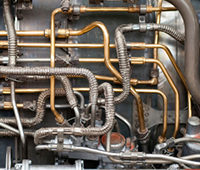Thermal Systems Modeling
Many hydraulic applications in automotive, aerospace, and industrial controls require that the thermodynamics of the system be taken into account while modeling. Thermal management is an obvious application in which heat flow plays a critical role, but there are many more. Key aspects such as component behaviors and system efficiencies often depend on properly taking thermal effects into account. The ability to include thermal effects within a physical model of systems is critical for analyzing the performance, optimizing the component designs, and predicting reliability.

Using a wealth of industry experience and MATLAB and Simulink expertise, MathWorks Consulting Services will coach, demonstrate, and assist you in the development of your physical modeling system from library customization, to system-level simulation, control design, embedded code generation, and real-time hardware-in-the-loop testing and deployment.
Accelerating Project Development
MathWorks Consulting Services teaches you best practices to establish a Model-Based Design environment that serves present and future modeling needs within your organization. We help you determine a suitable representation of all heat flows and losses and sufficient approximation of the fluid’s temperature-dependence properties. We teach you techniques to automate parameter estimation using advanced optimization algorithms—a great time-saver during product prototyping and continuous verification.
Determining appropriate model structure with incomplete data can be difficult
Typically, the properties and parameters that define model behavior are determined as the model evolves. The origins of these properties and parameters may be data sheets, engineering specifications, laboratory mockup tests, or first principles but generally there is a combination of source types and often the data is incomplete. The fidelity of the model depends on the completeness of the data while the data depends on the insights gained from the model. This interdependence between the model structure and the model’s parameters requires engineering judgment to correctly structure the model to reflect the current stage of development. MathWorks Consultants understand component behavioral dependencies on fluid temperatures and help you determine the appropriate model structure and demonstrate how to incorporate the data you do have into the fluid properties and other model parameters.
Weighing importance of model fidelity against simulation speed
Building high performance models entails more than incorporating vendor data sheets and experimental data. Solver configuration is a critical element for hydraulic systems, which are inherently stiff with numerically intensive calculations. MathWorks Consultants guide you in optimizing solver performance and demonstrate systematically how to balance the tradeoff between model fidelity and simulation speed —critical for real-time operations, and important for larger, more complex physical systems.
Creating models and simulations that accurately represent behavior of real-world systems
MathWorks Consultants teach you to build your own set of blocks that closely capture the behavior of custom pumps, valves, or heat exchangers. Often, a realistic system simulation requires the integration of multiple physical domains. Mixed-flow applications where the fluid can range from 100% liquid to 100% gas, or multi-constituent applications such as bulk material handling are two such examples. These are scenarios in which MathWorks Consultants help you develop a library of custom blocks that are most suitable for your applications. This type of work leaves you with a solid base library on which you can apply newly gained in-house expertise for an extended set of custom library components.
MathWorks Consulting Services works with you to:
- Select and achieve the desired level of accuracy of your multidomain system model
- Incorporate accurate thermal fluid properties into your models
- Automate parameter estimation
- Apply Model-Based Design to control development and reduce development effort and time-to-market
- Build in-house competency through consolidated coaching sessions and knowledge transfer
